|
In July 1983, the Arthur Storer
Building, housing the Law School, and Economics and
Social Studies opened. By 1985 there were around 4,500 full
time and sandwich course students and 2,800 part time
students. In 1981 the departments of
mechanical, electrical and production engineering were
united to form the School of Engineering.
|
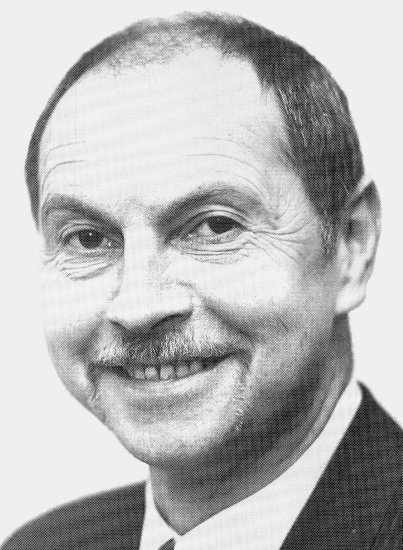
Mick Harrison.
Courtesy of David Parsons. |
The Polytechnic had a new director
in 1985 in the form of Professor Michael Harrison. Mick
Harrison was also a governor of Thomas Telford School,
and of Bilston College. He became a member of the
council of the Chamber of Commerce and Industry, a
trustee of the Black Country Heritage Trust, and a
member of the board of the Wolverhampton City Challenge
Project. He also had extensive international links.
Mick Harrison was a graduate of Leicester
University, where he began his teaching
career. He then moved to London and taught
at Enfield Technical College before moving
to Leeds University.
He then returned to Enfield Technical
College and was there from 1968 to 1971 when
it became part of Middlesex Polytechnic.
After several other teaching jobs, he moved
to Hull College of Higher Education where he
became Dean of the Faculty of Business and
Management Studies.
In 1982 he moved to Wolverhampton and
became Dean and Assistant Director of the
Polytechnic. He then became Deputy Director,
before becoming Director in 1985. |
|
|

Wulfruna Street in the early
1970s. |
|

Looking across the Polytechnic
from St. Peter's Church in June 1988. |
|
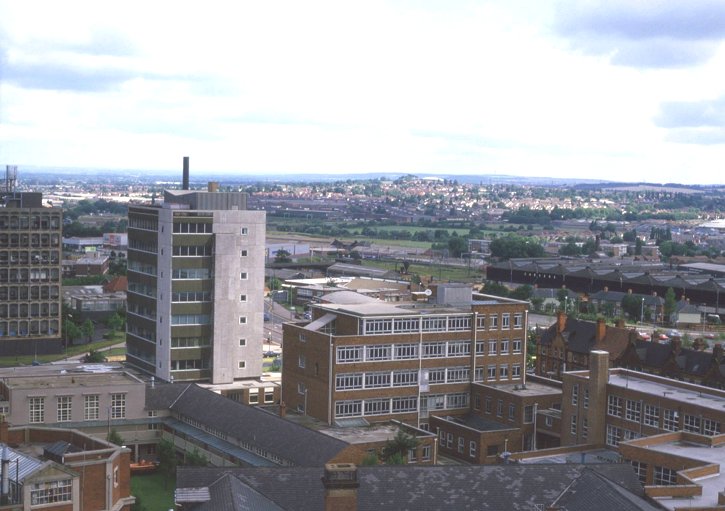
Another view of the Polytechnic
from St. Peter's Church in June 1988. |
|
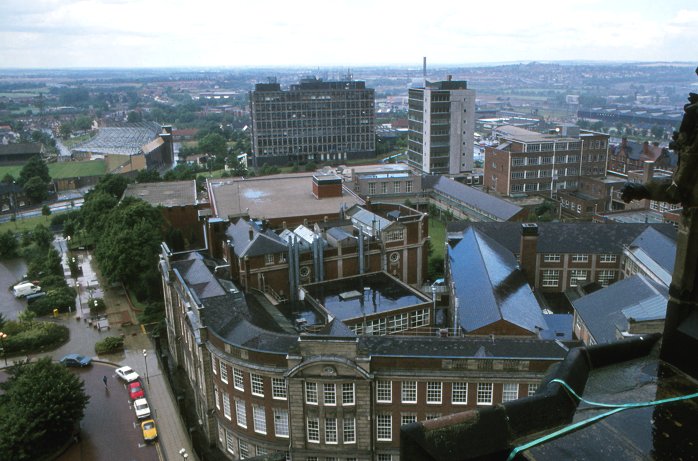
Another view from St. Peter's
Church. |
|
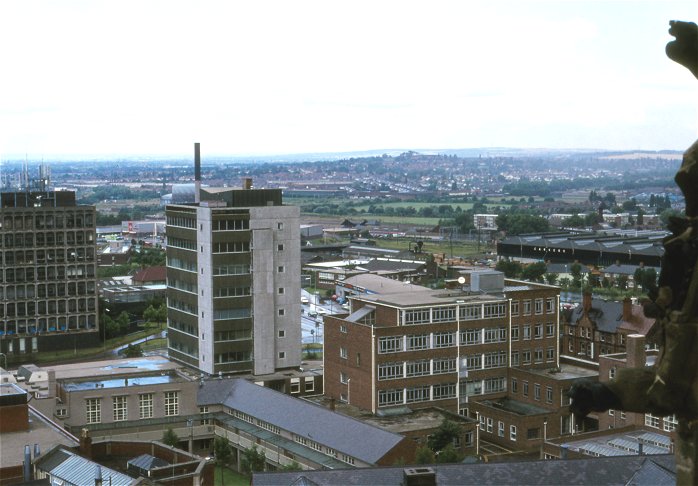
A final view from St. Peter's
Church. |
| In the late 1970s and early 1980s
the Polytechnic had its own 'underground' satirical
magazine called 'Wolfbane', produced by Paul Hudson. |

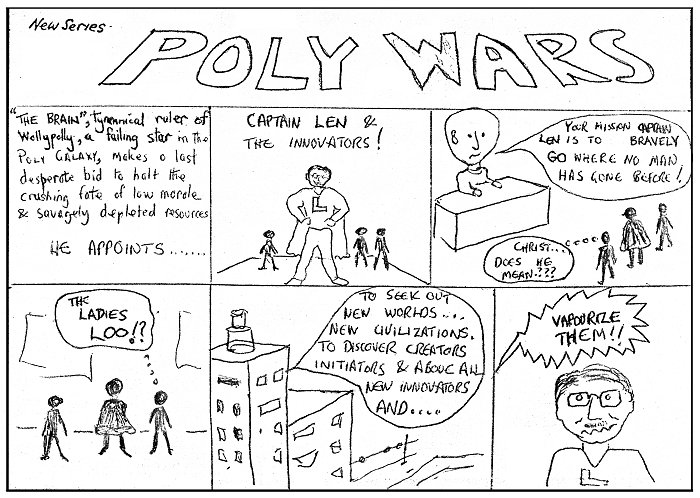
A cartoon from Wolfbane, date
unknown.
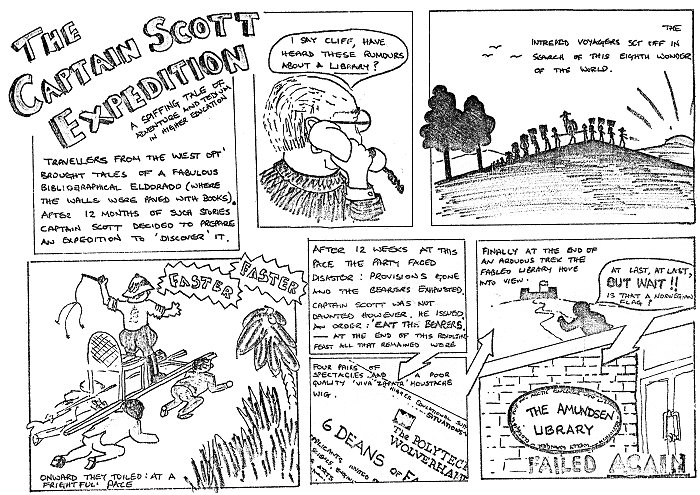
A cartoon from a 1977 edition of
Wolfbane.
| The following article from 1977 is about
‘Polydat’ and the Department of Computing
and Mathematics: |
|
The
virtual library: a new
concept in resource
management technology - C.
B. Hayter, Confusions and
Mythopoeics.
The
virtual library is an
important new concept in
resources management
technology. Basically it
involves a continuing
dynamically structured
dialogue between information
consumers and information
providers and coordinators
in a goal-oriented attempt
to delineate a formally
hierarchised functional
profile of consumer
requirements. The dialogue
is driven by a network of
dedicated microprocessor
based systems co-operating
via a local area network
that can be dynamically
interfaced to the consumer's
word processor or personal
computer. Once the dialogue
is complete and the
potential information
consumer's functional
profile has been
constructed, the
professionally trained and
qualified information
providers and co-ordinators
take over the processing of
the consumer's request. They
will provide the consumer
with a structured list of
literature references
sequenced on a computed
relevance criterion. This
will enable the information
consumer to interface him or
her self to the acquisition
of a maximally relevant
subset of the source media
with a minimal diversion
from other activities.
The
Polytechnic has secured a
significant research
contract in this area as
part of the 6th sub-division
of the Japanese 5th
generation computer project.
The research will involve a
detailed investigation into
organisational methodologies
appropriate to the support
and monitoring of research
into inter- and
intra-personal
communications and dialogues
with special reference to
the efficient use of virtual
libraries. Awarding the
contract to the Polytechnic,
Deputy Information Minister
Yohoho Andabottleofrum said
that he had been
particularly impressed by
the immense depth and
breadth of the Polytechnic's
experience in the
formalisation of
organisational and
structural hierarchies.
Replying, Polytechnic
Director G****e S*******e
said that he was personally
honoured to be part of such
an ongoingly important
project. In an interview
with a reporter for
Pollywollydoodle Mr
S*******e said it would
almost certainly prove
necessary to establish
several extra schools to
support the research effort.
He also welcomed the
opportunity to set up a
working party to delineate
the precise role of the
school as a facet of the
overall organisational
experience of the
Polytechnic.
As a
preliminary step the
Polytechnic has established
a committee to formalise and
co-ordinate proposals for
the establishment and
deployment of resources and
staff in this important
area. Support of the project
will require the
establishment of several
extra information providers,
co-ordinators and
inter-personal communication
handlers to be based on the
fourth floor of the Robert
Scott Library. It will also
require the provision of an
appropriate facility
infrastructure. In order to
provide the requisite office
space and resources, the
Polytechnic regrets that it
will no longer be able to
keep books in the Library. |
|
|
The article was written by the
late Peter Burden. |
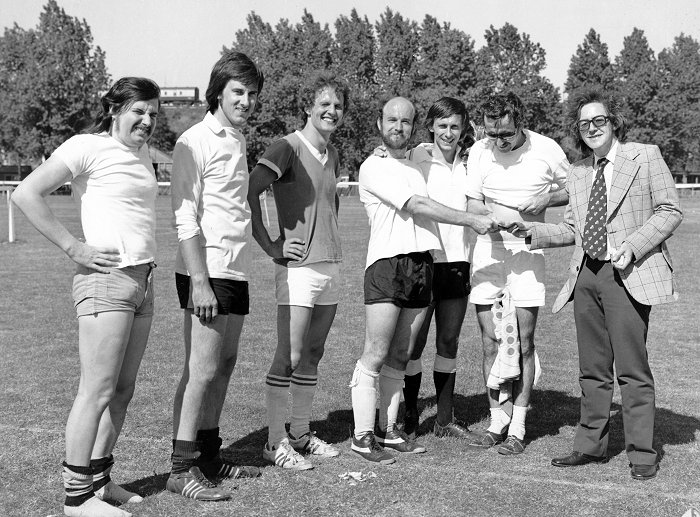
There were
inter-departmental football
competitions. Frank Sharman, on the
far right, from the Law School, is
handing out prizes to a winning
team. Courtesy of Frank Sharman. |
|

Another look at Wulfruna Street and
the main entrance. |
| PolySpective

Courtesy of David Parsons.
In the 1980s the polytechnic had its own
newsletter called PolySpective. It contained all of
the latest news about the polytechnic, including
staff changes, promotions, resignations, retirements
and the setting-up of new departments. The following
is from the October 1986 edition that was kindly
copied by David Parsons.
At the time there were many changes in the
directorate. Geoffrey Brooks was appointed as
Assistant Director of Administration and Resources,
John White became Deputy Director of Resource
Planning and Roger Waterhouse became Deputy Director
of Academic Planning. John McLaren became Dean of
Postgraduate Studies, Steve Bristow became Dean of
Modular Studies, Harry Plevy became Director of the
Unit of Industrial and Commercial Collaboration,
Gerald Bennett became Head of the School of Business
and Management, Norman Gough became Head of Computer
Aided Engineering in the School of Engineering, Bob
Jamieson became Head of the Centre for Health and
Biomedical Studies in the School of Applied
Sciences, Rob Cutler replaced Ian Andrews as
Personnel Officer, Dave Hopkins became Head of the
School of Languages and European Studies, John
Wildsmith became Head of the Faculty of Business and
Social Science and finally, Mr. W. J. Wilson became
Residential Services Officer.
At the time, the Health Studies Section and the
Psychology Section joined the newly formed Centre
for Health and Biomedical Studies in the School of
Applied Sciences, that would soon move to the Old
Post Office building in Lichfield Street and become
the School of Health Sciences. The Geography section
in the School of Applied Sciences was split in two.
The Environmental Geographers remained in the
school, but the Social and Human Geographers became
part of the School of Humanities and Cultural
Studies. The Audio Visual Aids Unit was
decentralised and the staff moved to other
departments.
The newsletter contained articles on the deaths
of some members of staff, including Danny Moore, a
caretaker in 'B Block' and a polytechnic driver, who
died of cancer, Bill Squire from the School of
Business and Management who died in a road accident,
also Richard Revell from the history section who
died suddenly at home.
In January 1985, ten rooms in the school of Art
and Design were sealed off after the discovery of
brown asbestos when a ceiling collapsed. Because of
this 450 students had their term extended so that
they could catch-up on their studies. Specialists
wearing protective clothing removed as much of the
asbestos as they could find.
In 1986, 2,200 new students arrived at the
polytechnic, 1,700 of whom applied for
accommodation. As a result, accommodation had to be
found for 450 students outside the hostels. 150 were
found accommodation with landladies, 100 at hotels
and guest houses and 200 in the private sector. |

Courtesy of David Parsons.
| In February 1989 the new Publicity Services
Department opened in room 122 in Molineux. The
new department was run by Roy Bayfield and
Melanie Whyatt. Roy, a Brighton Polytechnic Fine
Arts graduate worked at Wolverhampton Art
Gallery before joining the polytechnic.
Wolverhampton born Melanie, a Warwick University
English graduate previously worked at Birmingham
City Council's press office. The new
department's role included media relations,
polytechnic advertising, the annual prospectus,
and the staff newspaper, Polyspective. |
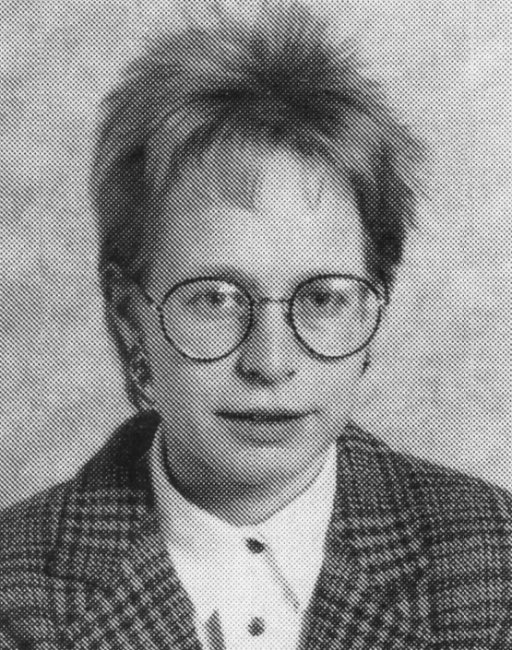 |
Melanie Whyatt.
Courtesy of David
Parsons. |
| Roy Bayfield.
Courtesy of David
Parsons. |
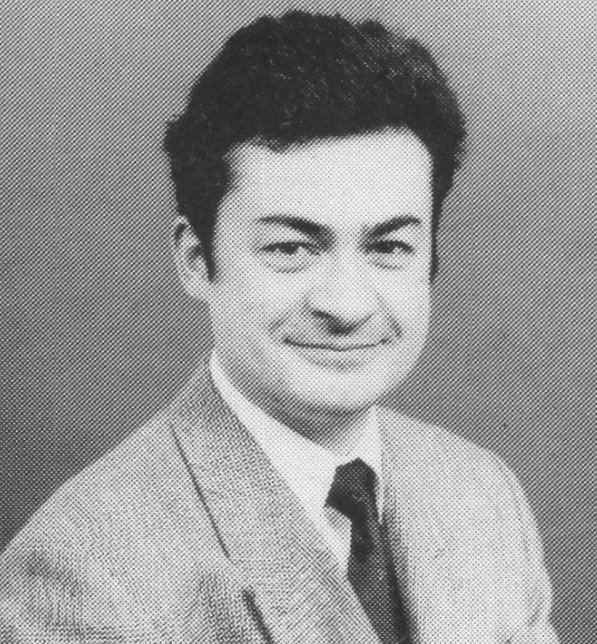 |
| Independence In April 1987, the government published a White
Paper called 'Higher Education: Meeting the
Challenge.' It set out plans to remove all
polytechnics and higher education colleges from
local authority control and to make them independent
corporate bodies. This became law in July 1988 as
the Education Reform Bill. From the 1st April 1989,
the board of governors assumed full responsibility
for the operation of the polytechnic, which became
the legal employer of all its staff and the owner of
all its property and assets.
It had been hoped that the name would be changed
to West Midlands Polytechnic, but this was rejected
by the Secretary of State for Education, Kenneth
Baker. As a result it became Wolverhampton
Polytechnic on the 3rd April, 1989.

At this time there
were 9,815 students, 3,000 of whom were women, 2,360
were mature students (over the age of 21), 5,618
were full-time students and 3,798 were part-time.
1,635 students were from the Black Country and 238
were from abroad.
At the time it was the only higher education
establishment in the country to have its own 'high
street' shop. |
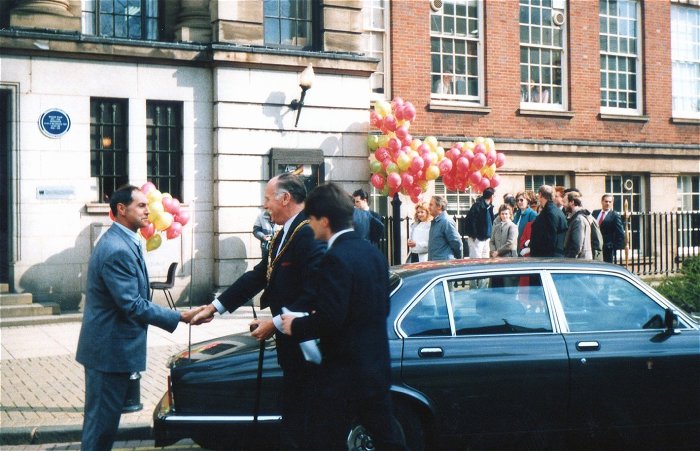
Professor Mick Harrison greets
the Mayor, Councillor Richards on Vesting Day,
Monday, 3rd
April, 1989. The mayors of Dudley, Walsall and
Wolverhampton were invited to the Vesting Day
ceremony and were each presented with a special
medal to mark the occasion. The medal had been
designed by Ron Dutton. Courtesy of David Parsons. |
|
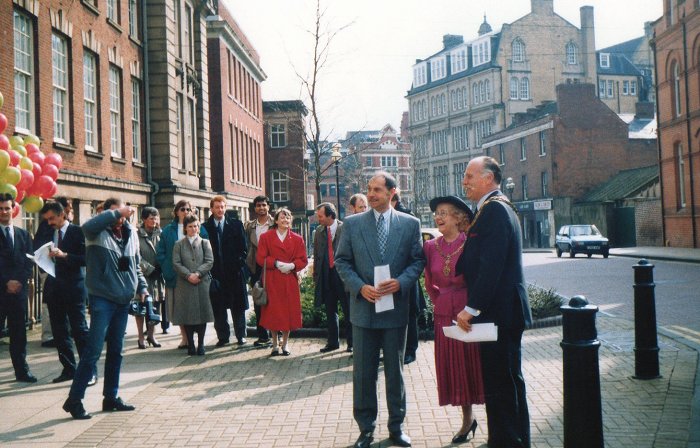
Another view of Mick Harrison
and the Mayor, on the 3rd April, 1989. Courtesy of
David Parsons. |
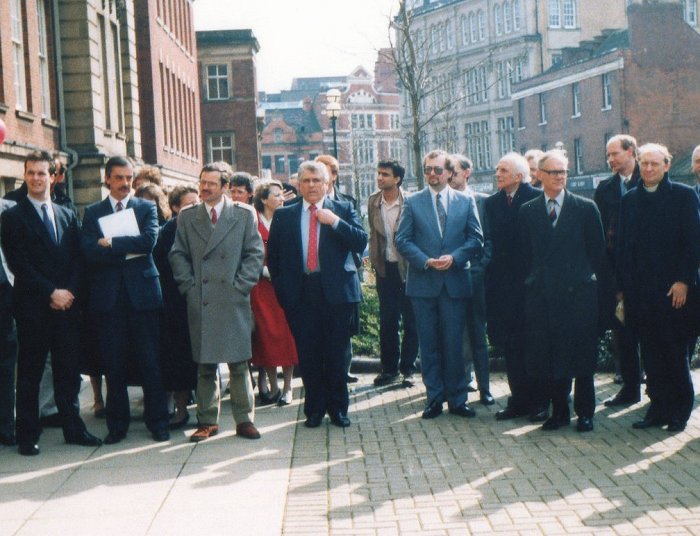
Some of the onlookers at
Vesting Day. On the extreme right is the
Polytechnic's Chaplain, the Rev. Geoffrey Wynne
who retired in 2010 after 44 years service. Courtesy
of David Parsons. |
|
In 1989 the Polytechnic merged with the West
Midlands College of Higher Education in Walsall, and in
1991 work began on a new campus in Telford to cater for
2,500 students.
West Midlands
College of Higher Education
1963 saw the opening of the West
Midlands College of Education in Gorway Road, Walsall.
It was originally allied to Birmingham University's
School of Education as a teachers training college.
Several extensions were added in 1968 including a drama
studio, a tutorial building, and a study building. A
library was added in 1971, followed in 1972 by a dining
hall, a medical centre, two student hostels, staff
accommodation, a physical education building, and a
music centre. In 1989 it became Wolverhampton
Polytechnic's Walsall Campus.
|
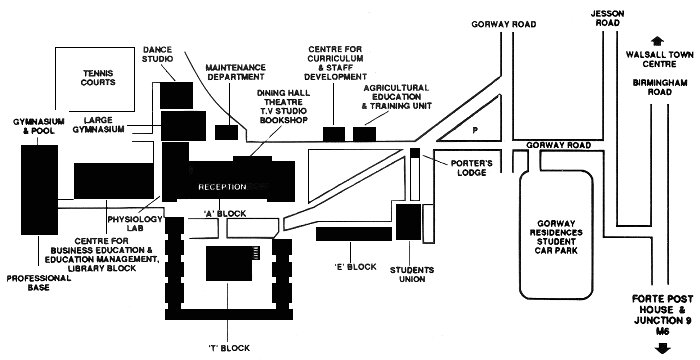
The Walsall Campus in about
1990. Courtesy of David Parsons. |
|
| In the 1980s, collaboration between
the Polytechnic and educational
establishments abroad greatly increased.
Students and staff in the Faculty of Art
and Design exchanged places with
colleagues at Alfred University in New
York State and some Management Studies
students gained MBA degrees at Penn
State University. There were also links
between the Faculty of Education and the
University and Polytechnic of Virginia
and the Department of Languages and
European Studies placed around 100
students in European educational
establishments each year. |
|

One of the study areas
in the mid 1980s. Courtesy of David Parsons. |
|
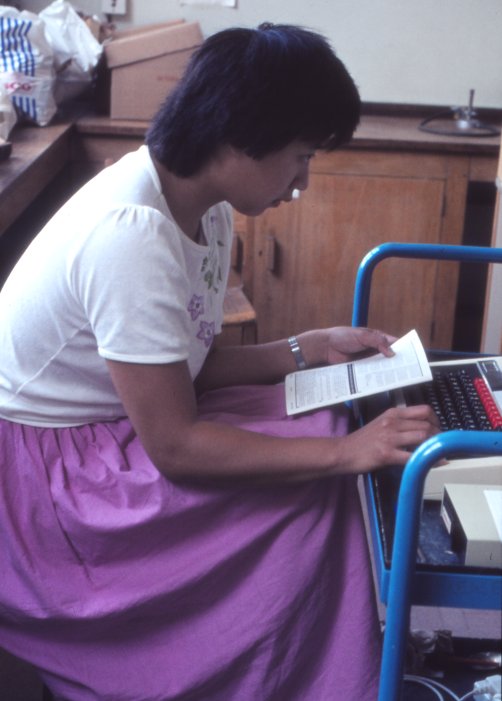
Noelma Shaw in 1984. |
The polytechnic had a large number of
BBC micros in the 1980s. In the photo
opposite, Noelma Shaw of Applied Sciences is
seen hard at work on a BBC micro programme.
Noelma was an expert on butterflies and
greatly added to the department's
collection.
She left the polytechnic near the end of
1984. |
|
In 1987 the newly formed School of Health
Sciences moved into the old post office
building in Lichfield Street, that
backed-onto Berry Street. The building
included the old Valhalla pub building on
the corner which became the Higher Education
Shop. The University continued to rent the building
until about 2007.
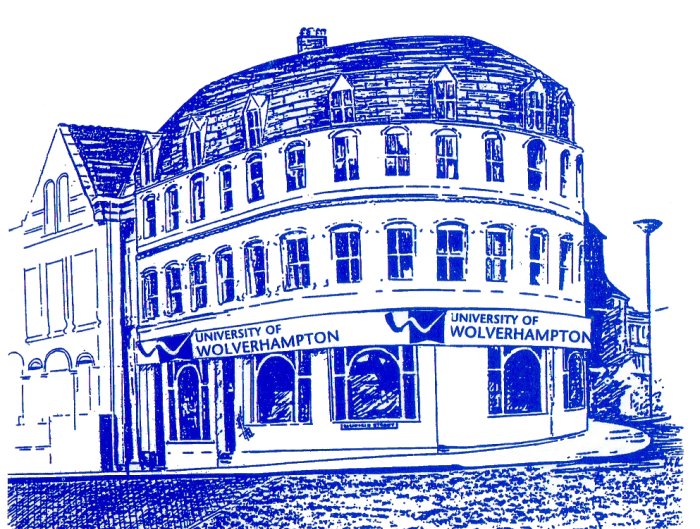
The Higher Education
Shop. From a University leaflet. Courtesy of
David Parsons.
|
|
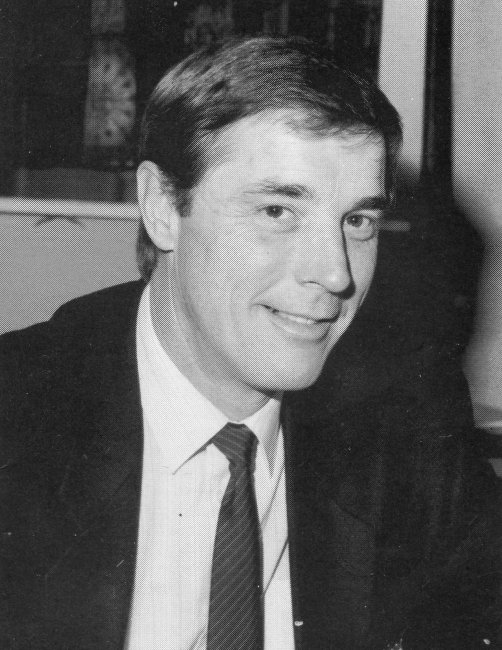
Ted Morgan.
Courtesy of David Parsons. |
Dr. Edward Morgan was appointed Head
of the School of Applied Sciences in
1989. Before taking up his new post,
he was Course Leader for BSc Biological
Sciences.
He graduated from University College
of Wales, at Aberystwyth, in zoology,
before completing his doctorate there in
1967. In the same year he joined
Wolverhampton and Staffordshire
Technical College.
His outside interests included
squash, cycling, walking, bridge and
rugby.
Ted retired from the university in
November 2002. |
|
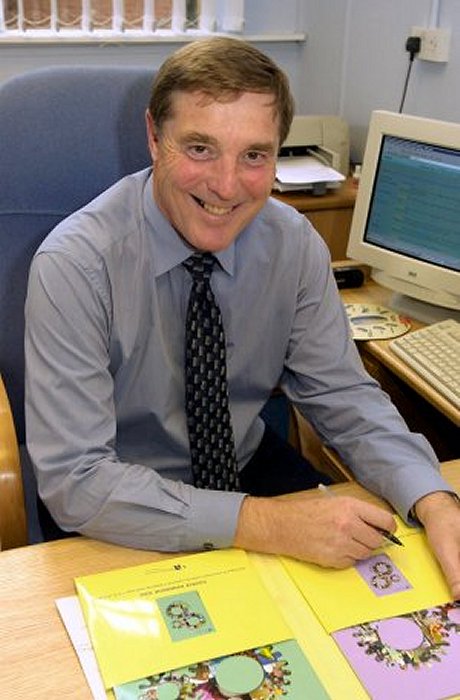
Ted Morgan at
his desk. |
The Finance and Personnel Departments and
the Estates Department moved to offices on
the Molineux football ground site where there
were also classrooms.
The Advice Centre and
the Registry moved to a building in Stafford
Street, on the corner of Whitmore Street.
The Polytechnic also acquired the building
next door, the old Drill Hall office
building, where there were classrooms and
offices.
In 1989 the new campus opened at Stafford
Park, Telford and in September 1989 the Art
and Design Library and the Law Library moved
onto the ground floor of the former Carvers
building off Stafford Street. |
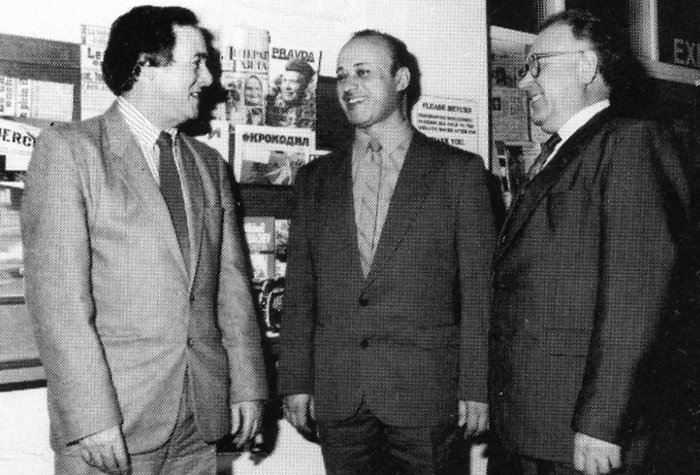
Dave Hopkins, Head
of the School of Languages and European
Studies (far left), greets two Russian
visitors in 1989. Courtesy of David
Parsons. |
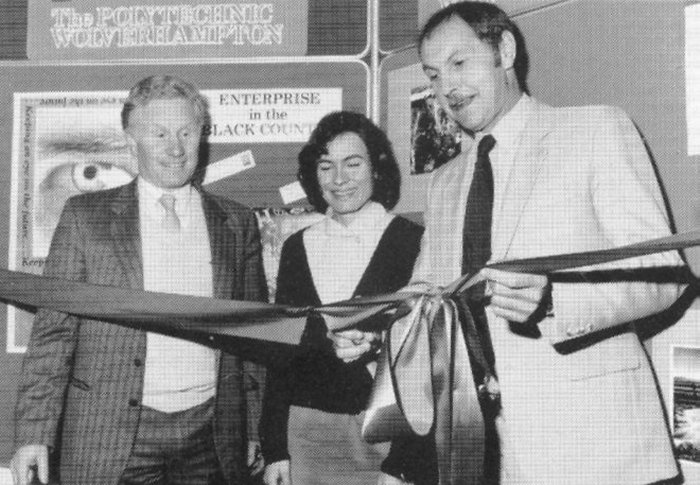
Mick Harrison
officially opens the Enterprise Centre
in 1989. On the left is Colin Appleby
and in the centre is Hannah Cowie.
Courtesy of David Parsons. |
|
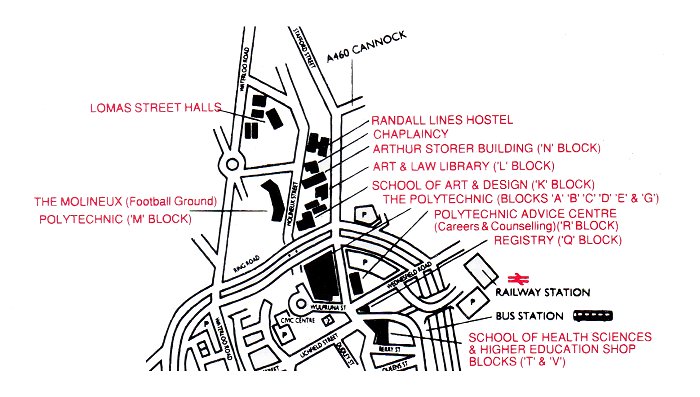
The location of the various
buildings around main site. From a Polytechnic leaflet.
Courtesy of David Parsons. |
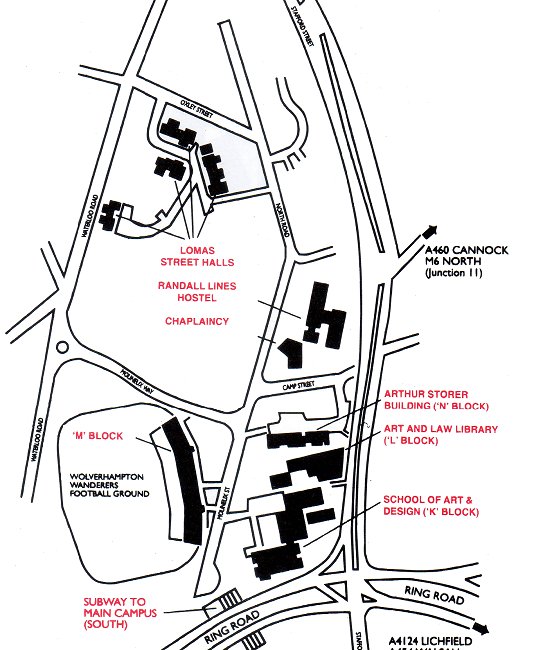 |
The northern end of the
site. Also from a Polytechnic leaflet.
Courtesy of David Parsons. |
| |
|
| Adverts for
staff, students and courses from the 1970s and 1980s |
 |
| |
|
|

The heading from a staff
newsletter. Courtesy of David Parsons. |
|
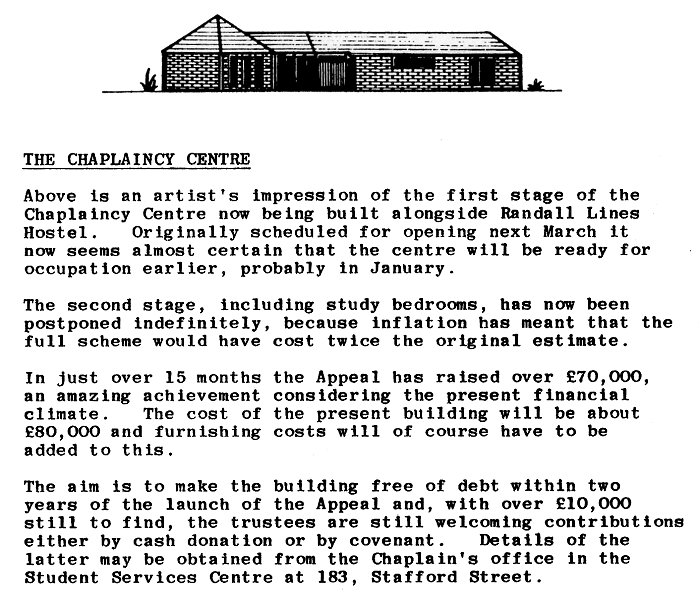
An article from the October 1980
staff newsletter. Courtesy of David Parsons. |
| The Chaplaincy Centre officially opened in March
1981. It was funded by many local churches, largely
due to the efforts of the Polytechnic's Senior
Chaplain, the Rev. Geoffrey Wynne. |
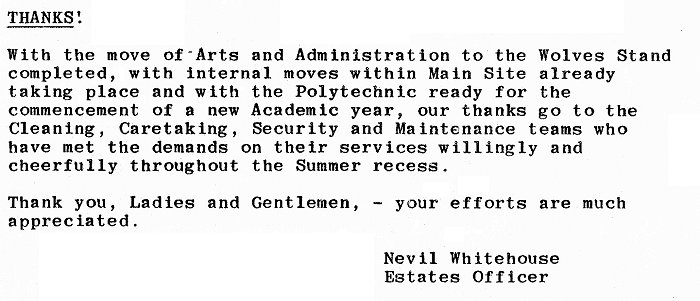
Another article from the October
1980 staff newsletter, describing the move to the
football ground. Courtesy of David Parsons. |
 |
Towards the end of the
1980s the Polytechnic began to produce its own
magazine. The photo
opposite is of the front cover of the first edition.
Courtesy of David Parsons. |
| Some members of staff who left in the 1970s and
1980s are well remembered. The caretaker, Jack Price,
kept the buildings secure, always with the help of
his dog. Others included Reg Morton, one of the founders of West
Midlands Studies, which helped with the formation of
the Ironbridge and Coalbrookdale museums.
Another was Mrs.
Harris, the refectory manageress, who always strictly ruled
her territory.
There was also the never to be forgotten, Elfed
Roberts, the lecturer in politics, who was extremely
popular and claimed to be known by every person in
the establishment. He left in 1978 and moved to Hong
Kong where he became a lecturer in political studies
at Hong Kong University. He was later an Associate
Professor there and became Head of Department of Pobl
Group, which created good homes for people. |
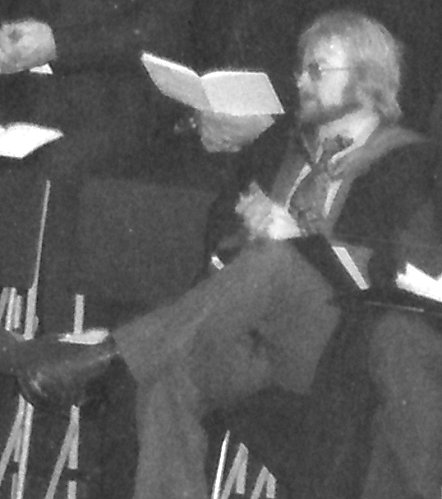
Elfed Roberts at
the 1974 Degree Ceremony in the Civic
Hall. |
Another well remembered figure was Bob Smith who ran
the maintenance department in the basement of 'G
Block' for many years. He was an electrical engineer
who was an expert on the distribution of electricity
in Wolverhampton and the surrounding area. The
maintenance department moved from 'G Block' to the
old Carvers building in Stafford Street.
Another person who was well known at the polytechnic
was Irene Hewitt who retired in 1980 after
completing 42 years of service in administration.
| The retirement
party held for long serving Mrs.
Margaret Rownes who worked in the
Registration Department. She was a
long-serving staff member who worked
there for 37 years, starting at the
Wolverhampton and Staffordshire
Technical College at the age of 15.
At the back is
John White, Deputy Vice Chancellor and
Deputy Director.
Courtesy of
David Parsons. |
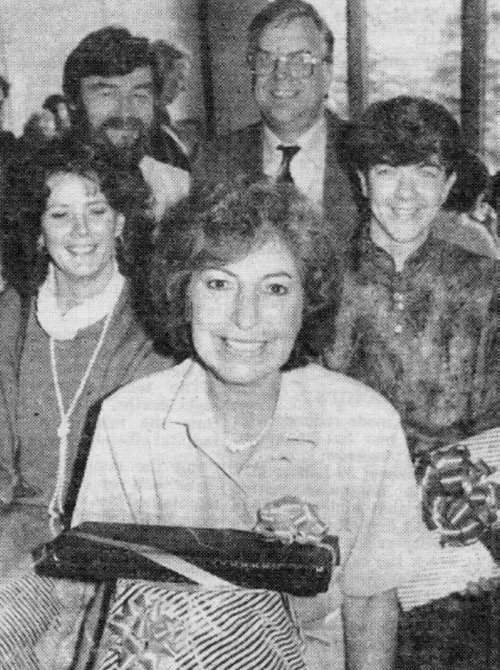 |
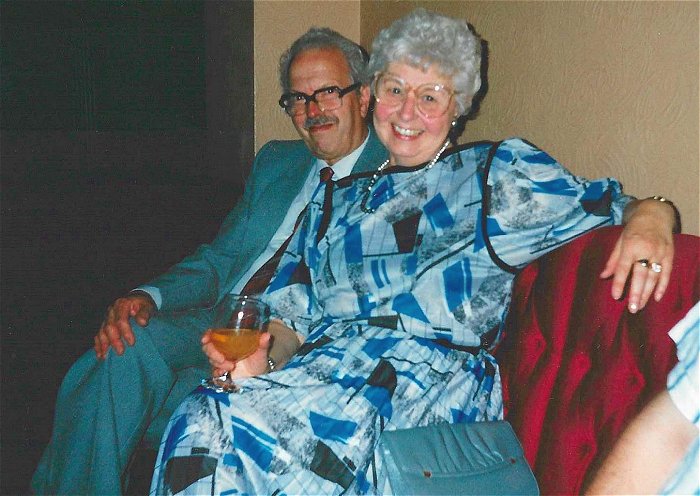
Arnold Collett
and his wife at his retirement party
in the late 1980s. He was a
well-known lecturer in the Maths and
Computing Department. Courtesy of
David Parsons. |
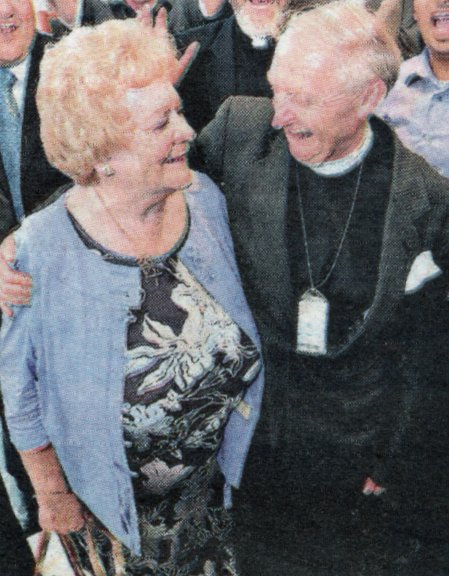
Geoff Wynne
and his wife Gaynor at his
retirement party. A newspaper
cutting from an unknown newspaper. |
A long-serving member of staff
is the Rev. Geoffrey Wynne who
started his career at the college in
1966 and retired 44 years later on
the 3rd July, 2010. He had been
taught at St. Joseph's College in
Shropshire by former monk, Tom Baker, who became an actor and was well
known as Doctor Who.
In 1979 he inaugurated an appeal
to build the polytechnic's
Chaplaincy Centre, which
officially opened in March 1981 and
had been funded by many local
churches.
In 2009 he received an honorary
doctorate for his achievements at
the polytechnic and the university.
In 2020 he is still active, as a
Director and Minister of Religion at
Tettenhall College. |
|
 |
|
 |
|
 |
Return to
Electrical Engineering |
|
Return to
the contents |
|
Proceed to
The 1990s |
|